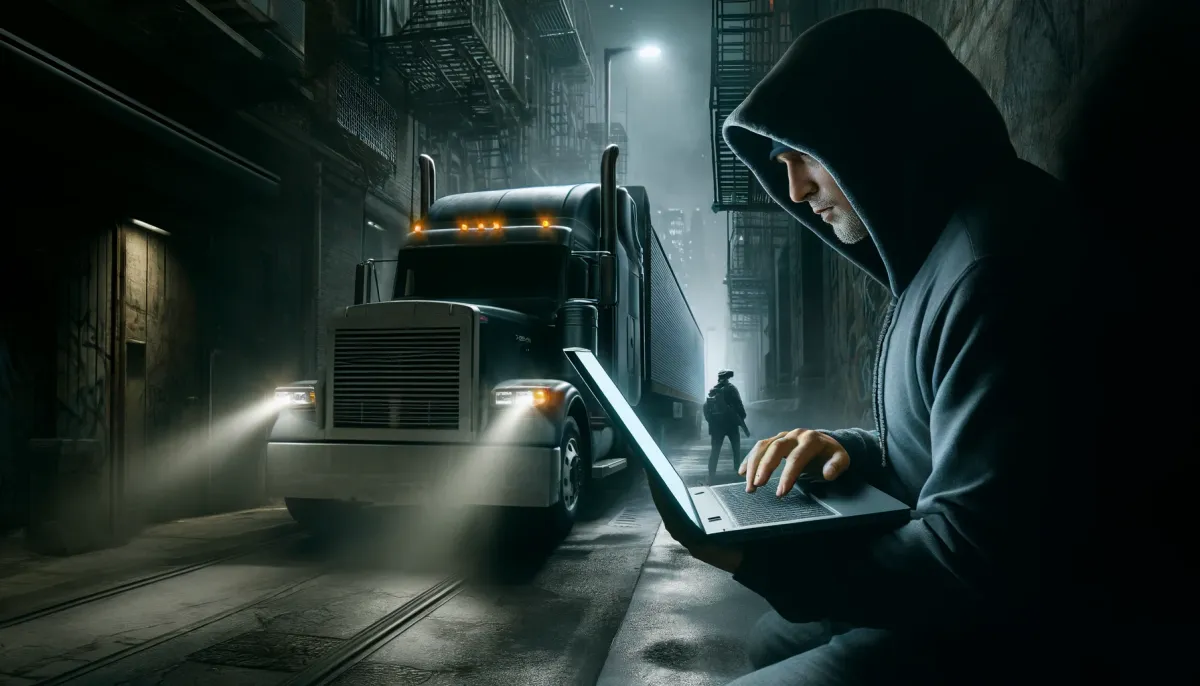Digital Highway Robbery Threatens U.S. Trucking
[Part 1 of 3] There's an alarming trend of cyberattacks in trucking, a sector integral to the U.S. economy. Industry experts highlight the critical need for advanced cyber defenses.

This article is the first installment in a three-part series exploring the trucking industry's urgent need to adopt more robust cybersecurity measures.
By Alan Schmadtke, for The Inside Lane
The trucking industry is facing a new kind of highway robbery: cyberattacks.
Although digital security breaches targeting this sector rarely make headlines, they are neither uncommon nor insignificant. Law enforcement and industry insiders alike sound the alarm on an unsettling trend: the frequency of these attacks is poised to climb.
It's a wake-up call to an industry that forms the backbone of the American economy, underscoring the urgent need for fortified cyber defenses.
Hackers exploit vulnerable technology to disrupt and extort businesses, always ready to strike. Earlier this month, Change Healthcare fell victim to its second cyberattack of the year. This breach not only paralyzed the company's operations but also delayed millions of dollars in payments to healthcare providers, demonstrating the extensive consequences of cyber insecurity.
Last fall, Virginia-based Estes Express Lines suffered a ransomware attack that impacted the family-owned company’s IT infrastructure. A data breach report sent to Maine’s Attorney General showed the company chose not to pay the ransom. Estes stated its client's social security numbers and other personal information were stolen in the breach.

The underlying threat to the trucking industry
Beneath the surface of mainstream media coverage, the silent threat of crippling cyberattacks looms over the U.S. trucking industry.
“There's no solution with blinking lights and no amount of money that will get you completely out of this,” said Urban Jonson, a cyber security analyst with SERJON, which consults with trucking companies and other businesses about protecting systems and networks.
“It’s not a matter of how much money you spend to fix it. It’s a matter of doing the homework upfront to analyze your business, identify your critical systems, and figure out how you make sure that you have good backups for those systems.”
Jonson, who has worked closely with the trucking industry for a decade, said the sector counts as only 5% of cyber security attacks in the United States. While that low number is good, he said, it’s likely only going to go up.
Detailed statistics about cyber crimes exist, but no one knows how accurately they capture the full picture of criminal activity. That’s because many attacks never make it to a local police or FBI incident reports.
“Businesses a lot of times don’t report them,” Trina Martin, an FBI cyber intelligence analyst told The Inside Lane. “They don’t want it to get out, don’t want to let their vendors know they were breached.”

Data on cybercrime in the trucking sector
The rise in cyberattacks on trucking companies in recent years is alarming.
FBI data shows 35 reported ransomware attacks on trucking companies from 2016-24. It documents 34 data breaches in 2023-24 and 25 phishing episodes already in 2024.
In none of the events did businesses report losing more than $450,000, and some said they lost no money, aside from lost wages and opportunity cost while operations were shut down.
“But even if you don’t lose money, you’re still losing,” Martin said. “It’s costly in so many ways.”
Cyber experts and law enforcement officials divide cyberattackers into two categories: bad actors and nation-state hackers.
Bad actors are rarely a single person and are more often a group of hackers united by the desire for money.
Nation-state criminals don’t need money, and they don’t ask. Instead, their goal is to create chaos and anger and generate dangerous situations.
Criminals wreak havoc on the industry
Beyond the general landscape of cyber threats, trucking companies encounter distinct vulnerabilities that expose them to unique risks.
- A hack that stops one truck or a small fleet.
- An attack that wreaks havoc with the company’s general systems, damaging email and phone communications, and silencing truck tracking and timecard systems.
- An attack that targets an owner-operator’s backend data systems, blowing up invoicing, sales, collections, payroll, customer, and financial data.
The last one, which is what happened to Change Healthcare, is the nightmare scenario.
Martin, who has worked in cyber intelligence at the FBI for 13 years following a 20-year IT career and a stint as a Naval intelligence officer, tracks three basic types of cyber crimes: Ransomware attacks, business email compromise (BEC) attacks (also called phishing attacks), and data breaches.
"Cybercrime is not on the decline," Martin said. "It is the FBI’s No. 3 threat to stop. It’s not slowing down. Every time we knock one down, there’s another standing up somewhere else."
Thank you for reading the first installment of The Inside Lane's three-part series on cybersecurity in the trucking industry.
In Part 2, we delve into the realm of cyberattacks, examining vulnerabilities within truck and fleet operations and the measures being implemented to enhance security. Read it here.
Part 3 provides strategies, tactics, and tips to help small and mid-sized trucking companies fortify their defenses against cyber threats. Read it here.
Have a question or comment about this article? Email Bianca Prieto at editor@theinsidelane.co
Not yet a subscriber? Join here.





Comments ()